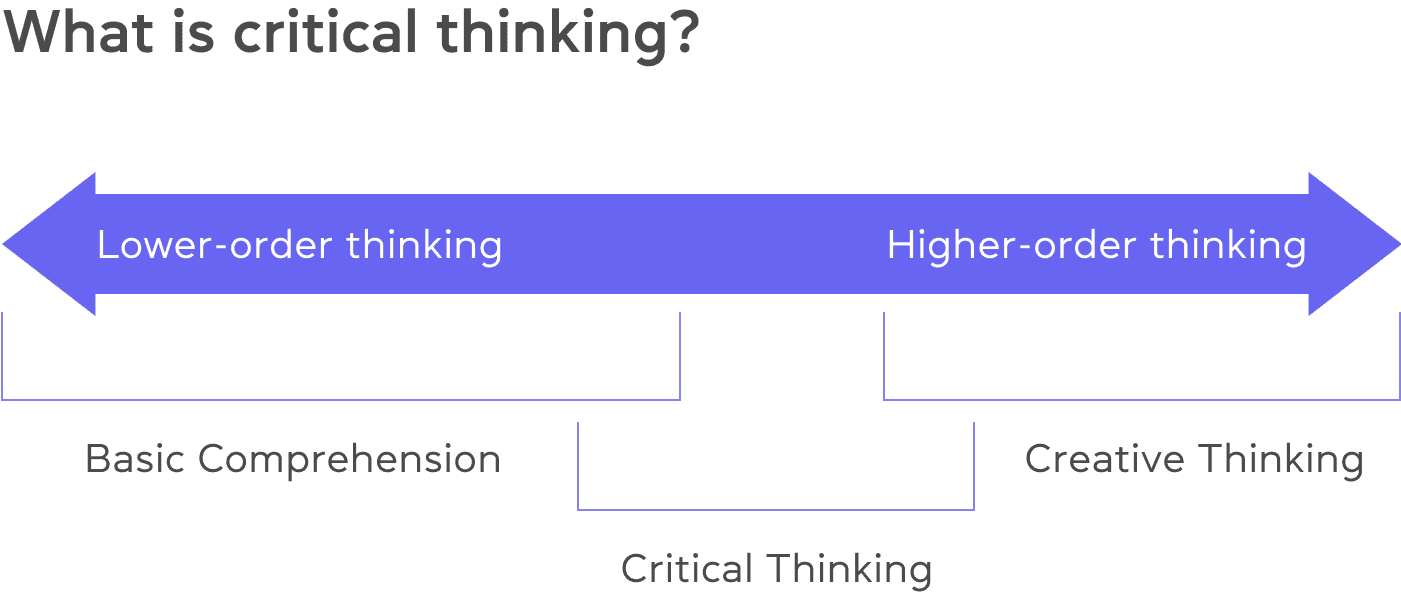
Top 5 Mistakes in CAE Writing
- Cambridge English
- Tips & Strategies

01.02.2023
Much is said about the importance of transforming the system of education and the way we teach learners to meet the challenges of the present days. One of the responses to the need for changes in education is the development of 21st-century skills for the classroom, such as critical thinking and problem solving, collaboration, communication, creativity, citizenship, digital literacy, and leadership. It is crucial to put emphasis on these skills development, otherwise, we will continue trying to meet the future by doing what we did in the past.
Improve Your Teacher Talk
You must have heard about the need to develop critical thinking skills. However, at the same time, you are likely to have a vague idea of what exactly it is. In this article, we will discuss what critical thinking is, why it is essential to develop it and how it can be practically developed during the lessons of English.
According to the dictionary, critical thinking is defined as “the process of thinking carefully about a subject or idea, without allowing feelings or opinions to affect you”.
In other words, at a very basic level, critical thinking deals with finding out whether something is true, partly true or not true at all. John Hughes (2014) defines it as a variety of sub-skills and abilities to deal with these more complex areas when a writer can disguise his or her bias, offer facts when in reality they are opinion, or use emotive words that will appeal to a reader’s own feelings or inclinations.
What is guided discovery in ELT?
If we look at how the concept of critical thinking can be applied to teaching, we should mention Bloom’s Taxonomy. It includes different types of thinking that lead to learning (Hughes, 2014:2). Then, Krathwohl and Anderson revised the taxonomy and arranged the hierarchy of thinking skills from lower to higher level. These skills, namely, remembering, understanding, applying, analysing, evaluating, and creating, should be developed in order to learn more effectively.
John Hughes and Paul Dummett (2019) made a correlation between the six thinking skills and broader levels of thinking: basic comprehension, critical thinking, and creative thinking.

If we correlate the levels of thinking with the activities in the EFL classroom, we will see that on the level of basic understanding, learners should be able to fill in the gaps, do the matching activity, and find the answer in the text. The level of critical thinking enables them to analyse the text or infer the meaning, and evaluate the opinion. The higher level of thinking that correlates with creating thinking enables learners to create a presentation or write an essay.
Dummett and Hughes (2019) stressed the importance of the following core beliefs. Effective language learning is based on thinking skills of both higher and lower levels. Therefore, none of them is inferior or superior and they should be balanced in education. On top of that, critical thinking plays a crucial role in the processing and production of language.

1. Developing a critical mindset.
The aim is to raise learners' awareness of the critical thinking concept and what it is like to be a critical thinker.
Give the learners a controversial statement, e.g., You can’t have a happy family life and a successful career at the same time.
Ask the learners to agree or disagree with the statement and express their opinion.
2. Developing questioning sub-skills
The aim is to develop critical questioning sub-skills.
Pre-teach questions words for lower levels (What, Where, When, etc.). Give the learners a list of closed questions for their groupmates and ask them to come up with additional 2-3 open-ended questions. What is more, encourage them to use the questions which might be asked when thinking critically: e.g., Why do you think so? What is the evidence? How said that?

What should be the structure of a receptive skills lesson?
Find out3. Contrasting the fact and opinion
The aim is to differentiate the writer's opinion (subjective judgment) and the factual information (objective facts).
Select several sentences which contain facts and personal opinions. Ask learners to decide which ones are facts and which sentences include the speaker’s opinion. Then, ask learners to underline the words which helped them to identify the sentences with the personal opinion. For instance, such words as I believe,/ From my perspective,/ Unfortunately can indicate the personal opinion.
4. Understanding the connotation (reading between the lines)
The aim is to identify the implicit meaning and the vocabulary connotation.
Select the sentences with words that have a negative meaning, e.g., Jim will never buy you a drink, he is so tight fisted! Then, ask learners to replace these words with the synonyms that have a positive connotation: thrifty.
Using tasks during English lessons
5. Developing critical reflection sub-skills
The aim is to develop the sub-skills of analysing, identifying, and assessing.
After learners have done a writing task, either provide them with or create together a checklist with the criteria to assess their writings. Then, let learners check their works (or their peers’ works) against the criteria. This activity will help to raise learners’ awareness of the task requirements and will enable them to self-monitor their progress.

Critical thinking means helping learners to find answers for themselves, questioning facts rather than simply accepting them, considering different sources of information, and asking ‘Why?’
Taking such critical approaches to learning helps learners to be more independent and analytical, formulate and test hypotheses, consider other points of view, and justify and explain their own ideas.

How to survive in a mixed-ability class?
Read the adviceOlena Bochkarova
Author
Academic Director & Experienced Teacher | General & Business English, IELTS Prep | CELTA & CELT-S Trainer | International Speaking Examiner | Course Consultant
Comments
Leave your comment